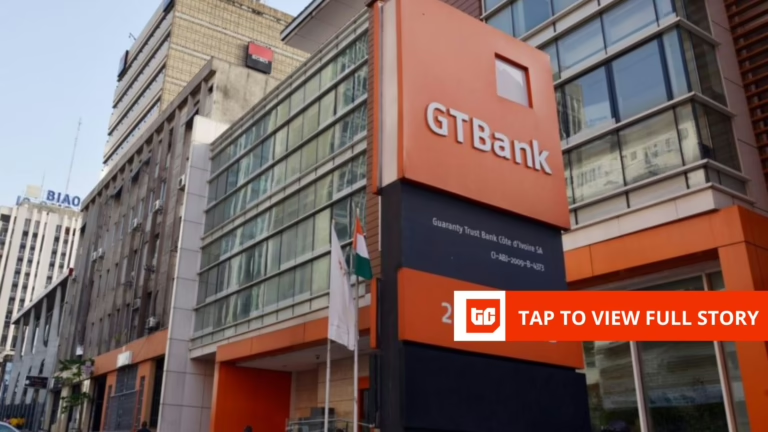Guaranty Trust Holding Company Plc (GTCO), recognized as one of Nigeria’s foremost financial conglomerates, employed 5,866 individuals as of June 2025, marking a slight increase of 37 staff compared to the previous year.
According to GTCO’s mid-2025 financial disclosure, fewer than 722 employees receive monthly salaries exceeding ₦1 million (approximately $682.46), representing less than one-eighth of the workforce. The largest segment, comprising 1,404 employees, earns between ₦377,500.08 ($257.63) and ₦494,167.67 ($337.25) monthly. The group reported a profit after tax of ₦449.01 billion ($306.43 million), which is a 50.42% decline from ₦905.57 billion ($618.01 million) recorded in the same period the previous year.
In response to Nigeria’s escalating inflation, GTBank, the banking arm of GTCO, implemented a 40% salary increase in September 2024. Consequently, by June 2025, personnel costs rose by 31.08%, reaching ₦54.39 billion ($37.12 million), up from ₦41.50 billion ($28.32 million) in June 2024.
Profit Versus Compensation: H1 2025 Overview
During the first half of 2025, GTCO achieved a post-tax profit of ₦449.01 billion. The total expenditure on its 5,866 permanent employees and directors amounted to ₦56.04 billion. Below is a detailed breakdown.
Average Profit After Tax per Employee
Average Staff Cost per Employee
For every ₦1 spent on total personnel costs (staff and directors), GTCO generated…
…in profit after tax.
Source: GTCO 2025 Half-Year Financial Report. Figures represent the six-month period. Total People Cost (₦56.04B) includes Staff Personnel Expenses (₦54.39B) plus Directors’ Emoluments (₦1.65B). Staff count (5,866) excludes outsourced personnel.
Despite the recent salary adjustments, the majority of GTCO’s workforce continues to earn less than ₦1 million monthly, highlighting a widening disparity between executive pay and that of lower-level employees.
Directors’ remuneration, which is accounted for separately from personnel expenses, increased by 29.54% to ₦1.65 billion from ₦1.28 billion the previous year. The top-earning director received ₦209.07 million in the first half of 2025, a 55.62% reduction from ₦471.08 million in the same period of 2024. Among the directors, three earned between ₦13.50 million and ₦22.50 million, while two surpassed ₦22.50 million. These figures exclude pension and other benefits.
The Wage Disparity
How many years would it take for an average GTCO employee to accumulate the ₦209.07 million earned by the highest-paid director in just six months?
Source: GTCO 2025 Half-Year Financial Report. The comparison is based on the director’s six-month earnings versus the calculated monthly midpoint of the selected staff salary band.
GTCO’s full-time workforce includes only two executive directors, alongside 297 management personnel and 5,567 non-management employees. The disclosed salary brackets exclude additional benefits such as profit-sharing, 13th-month bonuses, and equity-based incentives. For example, as of June 30, 2025, senior management was granted 461,172 shares valued at ₦43 million, based on a share price of ₦93.25, as part of share appreciation rights.
The company’s report states that “the average number of employees, excluding directors, earning above ₦720,000 annually received emoluments (excluding pension and certain benefits) within the following ranges:”
GTCO’s Annual Salary Distribution
How are the 5,864 employees distributed across salary bands? The chart illustrates the number of staff within each annual salary bracket as of June 2025. Hover over each bar to view monthly salary estimates.
Source: GTCO 2025 Half-Year Financial Report. Monthly figures are approximations for context.
It is important to note that these salary figures exclude expenses related to outsourced personnel, which surged by 36.43% to ₦19.73 billion ($13.47 million) from ₦14.46 billion ($9.87 million) in June 2024. The bank clarified that “outsourcing services refer to wages paid to contract staff engaged through third-party providers.”
Contract employees, often fulfilling roles such as tellers and customer service agents, are vital to the Nigerian banking sector, frequently serving as the initial point of interaction with customers. In 2021, they constituted 42.75% of the 90,455 individuals employed in the banking industry, according to the National Bureau of Statistics. The Nigeria Employers’ Consultative Association highlights that banks can reduce labor costs by up to 40% through outsourcing.
Note: Exchange rate applied is ₦1,465.29 to $1.






















0 Comments